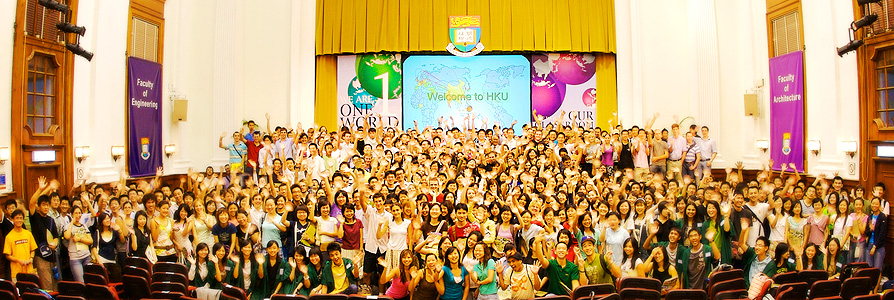Teaching & Learning
Teaching & Learning
Governance and Planning
Teaching and learning is central to the University’s Mission, which together with the University’s Vision and Role statements articulate HKU’s position as an English-medium, research intensive institution, committed to providing a campus-based education in a comprehensive range of academic disciplines for outstanding students by world-class academics.
Our academic pursuits, bench marked against leading institutions across the world, are globally competitive and regionally engaged, committed to producing well-rounded graduates with lifelong abilities to provide leadership within the societies they serve.
The next two years is one of unique challenge, particularly in the area of undergraduate education, as the University moves toward the partial implementation of the 4-year undergraduate curriculum in 2010 and full implementation in 2012.

Code of Academic Conduct
The University is committed to nurturing a positive, supportive, and respectful learning environment to underpin a productive and generative learning culture. Members of the campus community agree to act in ways that enable everyone to attain their academic and personal aspirations. Click here to learn more about the Code of Academic Conduct.
Forms of Learning
Experiential Learning
The incorporation of experiential and ‘out of classroom’ learning into the formal curriculum is standard practice in professional programs and is increasingly being formalized in non-professional programmes at HKU, such as internships at museums and non-Government organisations. This bottom-up initiative has been made one of the common learning experiences in the 4-year curriculum.
Other experiential learning is also organised at University level. The HKU Worldwide Student Exchange Programme administers reciprocal academic student exchanges with over 180 partner institutions in 25 countries. Incoming exchange students contribute to internationalising the campus while outgoing undergraduates invariably return as more mature and resourceful individuals after having acquired a rich learning experience in a different educational, social and cultural environment.
 Click here to learn more about Experiential Learning
Click here to learn more about Experiential Learning
Outcome-based Approach to Student Learning (OBASL)
Embedded in the plans for implementing the 4-year curriculum are strategies for making curriculum objectives and pedagogical concerns a more explicit focus. This is achieved through incorporating OBASL as an integral part of Curriculum Reform to ensure that the educational aims are achieved in students’ learning experiences rather than as a separate initiative in response to the University Grants Committee’s call. OBASL entails a shift in focus from teaching to learning. The ultimate goal is to engage students in deep understanding (deep learning) rather than a surface factual recall (surface learning) which teaching and learning research indicates is achieved through clear understanding and appreciation of the Learning Outcomes.
Problem-based Learning
The University adopts problem-based and student-centred learning to stimulate active learning among students. Everyday problems or situations are used as a way of stimulating students to discover and explore the key concepts and skills of the discipline in class, while teachers act as facilitators and guides in the process. This new learning method helps students to reason their way through problems, to think critically, and to learn to become self-directed lifelong learners.
Co-curricular Learning
The Centre of Development and Resources for Students (CEDARS) and the General Education Unit (GEU) are the main providers of co-curricular non-credit-bearing learning activities at HKU.Students also engage in community service or advocacy projects which typically entail a process of training, service and reflection. CEDARS liaises with Faculties on how to better integrate service learning with the formal curriculum.
Useful link:
HKU Teaching & Learning Website

